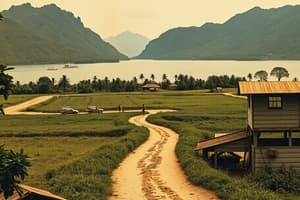Podcast
Questions and Answers
Which of the following interests in land represents the highest or ultimate interest, typically held by a community, stool, or family in Ghana?
Which of the following interests in land represents the highest or ultimate interest, typically held by a community, stool, or family in Ghana?
- Usufructuary Interest
- Leasehold Interest
- Allodial Title (correct)
- Customary Law Freehold
A non-member of a community acquires an interest in land carved out of the allodial title under customary law. Which type of interest does this BEST describe?
A non-member of a community acquires an interest in land carved out of the allodial title under customary law. Which type of interest does this BEST describe?
- Usufructuary Interest
- Customary Law Freehold (correct)
- Leasehold Interest
- Common Law Freehold
What is a key characteristic of the Customary Law Freehold interest in land?
What is a key characteristic of the Customary Law Freehold interest in land?
- It is exclusively available to citizens of Ghana.
- It is a perpetual interest, not subject to higher proprietary obligations. (correct)
- It is of limited duration and not inheritable.
- It is subject to proprietary obligations to the grantor.
Since August 1969, which of the following interests in stool and skin lands has been proscribed for acquisition by non-citizens?
Since August 1969, which of the following interests in stool and skin lands has been proscribed for acquisition by non-citizens?
Which interest in land was introduced by colonizers to enable foreigners to acquire land for development purposes such as cocoa farms and plantations?
Which interest in land was introduced by colonizers to enable foreigners to acquire land for development purposes such as cocoa farms and plantations?
What is a PRIMARY distinction between Common Law Freehold and Usufructuary Interest?
What is a PRIMARY distinction between Common Law Freehold and Usufructuary Interest?
Who can acquire a usufructuary interest in land?
Who can acquire a usufructuary interest in land?
How is a usufructuary interest typically acquired?
How is a usufructuary interest typically acquired?
Under what conditions can land be acquired through settlement by non-indigenes?
Under what conditions can land be acquired through settlement by non-indigenes?
Which of the following statements best describes the usufructuary interest?
Which of the following statements best describes the usufructuary interest?
What is required when a usufructuary interest is alienated to a stranger?
What is required when a usufructuary interest is alienated to a stranger?
What is the nature of a leasehold interest as defined by the Land Act, 1036?
What is the nature of a leasehold interest as defined by the Land Act, 1036?
Which of the following best describes customary land tenancies?
Which of the following best describes customary land tenancies?
What differentiates customary land law licenses from other land interests?
What differentiates customary land law licenses from other land interests?
What restriction does Section 10 of the Land Act place on land acquisition by non-Ghanaians?
What restriction does Section 10 of the Land Act place on land acquisition by non-Ghanaians?
What happens to leases held by non-citizens for more than 50 years before August 22nd, 1969, according to the Land Act?
What happens to leases held by non-citizens for more than 50 years before August 22nd, 1969, according to the Land Act?
Which of the following is a key distinction between a common law freehold and a customary freehold in Ghana?
Which of the following is a key distinction between a common law freehold and a customary freehold in Ghana?
What is the maximum duration allowed for a leasehold interest in land in Ghana, based on the information provided?
What is the maximum duration allowed for a leasehold interest in land in Ghana, based on the information provided?
Which of the following best describes the origin of leasehold interests in Ghana?
Which of the following best describes the origin of leasehold interests in Ghana?
A grantor conveys land 'to B for the life of C'. What type of common law freehold interest does this create?
A grantor conveys land 'to B for the life of C'. What type of common law freehold interest does this create?
Why is the concept of leasehold described as versatile in land law?
Why is the concept of leasehold described as versatile in land law?
Which of the following scenarios involves a sublease?
Which of the following scenarios involves a sublease?
What is the key difference in terminology between a 'lease' and a 'tenancy' according to the context?
What is the key difference in terminology between a 'lease' and a 'tenancy' according to the context?
In the context of land rights and interests, what does 'allodial holder' refer to?
In the context of land rights and interests, what does 'allodial holder' refer to?
Flashcards
Allodial Title
Allodial Title
Highest land interest, held by a community, stool, or family.
Customary Law Freehold
Customary Law Freehold
Interest carved out of allodial title for non-members under customary law, with perpetual duration.
Common Law Freehold
Common Law Freehold
Freehold interest introduced by colonizers, enabling strangers to acquire land.
Characteristics of Common Law Freehold
Characteristics of Common Law Freehold
Signup and view all the flashcards
Usufructuary Interest
Usufructuary Interest
Signup and view all the flashcards
How Allodial Title is Acquired
How Allodial Title is Acquired
Signup and view all the flashcards
Restriction on Common Law Freehold
Restriction on Common Law Freehold
Signup and view all the flashcards
Restriction on Customary Law Freehold
Restriction on Customary Law Freehold
Signup and view all the flashcards
Common Law Land Interests
Common Law Land Interests
Signup and view all the flashcards
Types of Common Law Freehold
Types of Common Law Freehold
Signup and view all the flashcards
Leasehold Interest
Leasehold Interest
Signup and view all the flashcards
Leasehold Term Limits (Ghana)
Leasehold Term Limits (Ghana)
Signup and view all the flashcards
Leasehold Origin
Leasehold Origin
Signup and view all the flashcards
Leasehold Concept
Leasehold Concept
Signup and view all the flashcards
Meaning of 'Lease'
Meaning of 'Lease'
Signup and view all the flashcards
Land Acquisition by Settlement
Land Acquisition by Settlement
Signup and view all the flashcards
Alienation to Strangers
Alienation to Strangers
Signup and view all the flashcards
Customary Land Tenancy
Customary Land Tenancy
Signup and view all the flashcards
Acquisition of Customary Tenancy
Acquisition of Customary Tenancy
Signup and view all the flashcards
Customary Land Law Licenses
Customary Land Law Licenses
Signup and view all the flashcards
Restrictions on Foreign Land Ownership
Restrictions on Foreign Land Ownership
Signup and view all the flashcards
Study Notes
Land Ownership and Types of Interests in Ghana
- Upon completing the lecture students should be able to describe land ownership, identify landowners in Ghana, outline land owner types, and differentiate between rights and interests in land.
Title to Land
- Ownership in land law is determined "title".
- "Title" is how someone establishes the right to land, often through a document or series of documents.
- A good title is always documentary.
- Section 64(1) of Land Act, 2020 (Act 1036) defines a good title in landownership, as derived from:
- A final court judgment by a court.
- Enactment.
- A grant or conveyance from the State.
- A customary grant/acquisition at least 30 years old.
- Land ownership includes possession of and title to land.
- A landowner can demonstrate that they and those through whom they claim title have possessed the land long enough to eliminate reasonable probability of a superior adverse claim.
Land Ownership Breakdown
- Private land constitutes about 80% of land ownership.
- Public land constitutes about 20%.
- Private land includes:
- Stool/Skin Lands
- Family/Clan Lands
- Individual Lands
- Public Lands
- State Lands: about 18%.
- Vested Lands: about 2%.
- Public lands are either state lands or vested lands, acquired by the state since the colonial era from customary landholders.
- State lands acquired through:
- Gifts/Donations from stools/skins/families.
- Compulsory Acquisitions.
- Vested Lands are not acquired lands; the the state has legal title, with allodial title remaining with customary holders (stools/skins/families).
- Article 257 (2) defines Public Lands to include: "Any land which immediately before the coming into force of the 1992 Constitution, was vested in the Government of Ghana on behalf of, and in trust for, the people of Ghana for the public services of Ghana, and any other land acquired in the public interest, for the purposes of the Government of Ghana before, on or after that date".
- Colonial government legislations used to acquire land for development, but these have since been repealed:
- Public Lands Ordinance, 1876 (Cap 134)
- Public Lands (Leasehold) Ordinance, 1950 -Administration of Ashanti Ordinance, 1902 (CAP 110)
- Administration Northern Territories Ordinance, 1902 (CAP 111)
- Current year legislations used to acquire land
- State Property and Contracts Act, 1960 (CA 6).
- Administration of Lands Act, 1962 (Act 123).
- State Lands Act, 1962 (Act 125).
- The Land Statutory Wayleaves Act, 1963 (Act 186).
- The State Lands Act, 1962 (Act 125) is the main legal instrument for compulsory land acquisition. -The Admin. of Lands Act, 1962 (Act 123) is for vesting of land in the state.
Rights and Interests
- A right in land is a formal permit, either gratuitous or for a fee (rent), to use someone else's land, requiring an oral or written agreement between the owner and user.
- It can be legal or equitable, such as easements.
- An interest is a beneficial right acquired to use another's land for a defined or undefined period.
- An interest acts like a "share" in the property, all interests are rights; not all rights in land are interests.
- Section 1 of Act 1036 of 2020 outlines the types of interests in land:
- Allodial title.
- Common law freehold
- Customary law freehold.
- Usufructuary interest.
- Leasehold interest.
- Customary tenancy.
Land Tenure and Tenure Security
- Upon completing the lecture, students should be able to understand what constitutes Land Tenure, describe the various types of Land Tenure, outline the dimensions of tenure security, and describe what contributes to tenure insecurity.
Key Definitions
- Land tenure systems determine "who can use what resource of the land for how long, and under what conditions."
- Land tenure constitutes a set of "rules invented by societies to regulate behaviour" regarding land ownership and usage.
- Understanding land tenure helps provide understandings into why land conflicts may occur.
- Disagreements regarding land tenure 'rules' are often at the heart of conflicts.
Types of Land Tenure
Land tenure is often categorized into four types:
- Private land rights are assigned to a private party, such as an individual, married couple, group, or a corporate body (commercial enterprise or non-profit organisation).
- Communal land rights allow each community member to use the land and resources. (s. 19 (1,6) of Land Act, 2020 (Act 1036)).
- Open access means specific rights are not assigned to any individual or group, excluding no one.
- State land is divided into State Public Land is assigned to a public sector entity, and Vested land both can be used for public purposes.
Land Tenure Regulations
- Land tenure and property rights are often used interchangeably.
- Distinctions must be made however such as "how property [and other] rights to land are to be allocated within society".
- Rules of tenure include rights to occupy, enjoy and use land and resources; cultivate and use land productively.
- These include rights can be usually summarized as "use rights, control rights, or transfer rights".
Land Tenure Systems
- Land relations regulated under statutory, customary, informal and religious forms of tenure are common in many countries.
- Common forms of statutory tenure include freehold, leasehold, public and private rental.
- Freehold rights are the strongest form of statutory right, possessing the most complete set of use, control and transfer rights, including the dominium right.
Security of Land Tenure
- The certainty that a person's rights to land will be recognized by others and protected in specific challenges is tenure security.
- The "degree of confidence that land users will not be arbitrarily deprived of the rights they enjoy over land and the economic benefits that flow from it" (UN-HABITAT, 2008) is security of tenure.
- The relative 'security' hinges on 3 variables:
- The Clarity and recognition of the land right
- The reasonableness of the duration of the right for the use to which it will be.
- The effectiveness of the protection against arbitrary curtailment of land rights, and the effectiveness of enforcement against loss of these rights.
- The relative security provided varies by land right, but it also be affected by insecurity or conflict.
- Perceptions of increased insecurity of tenure can contribute to armed conflict.
Effects of Tenure Security
- Greater incentive to undertake investments, because the return on long-term land improvement (assurance effect).
- Ability to credit (collateralisation effect)
- Protection against eviction, longer duration of land rights (less resources spent on defence and prevention of conflicts)
- Ability to transfer: increased pay off of investments (realizability effect)
- Securing land tenure/property rights contributes to enhancement of food security, reduction of conflict, addressing global climate change, and improves women's rights/governance.
Tenure Security is Enhanced by
- Legal Change
- Land titling
- Land Registration
- Formalization Projects
Instruments for Implementing Security
- The legal and institutional framework should be designed to accommodate legal/social tenure rights.
- Implementation strategy:
- Incremental Improvement
- Statutory Recognition
Land Rights and Interests in Ghana
- Students will outline land rights categories, will differentiate customary/common law rights, and dimension incidents of customary/common law rights/interests.
- Land rights include:
- Customary law land Rights.
- Common law (Statutory) rights.
- Section 1 of the Land Act, 2020 effectively lists the interests in and, giving a brief description:
- Allodial title.
- Common law freehold.
- Customary law freehold.
- Usufructuary interest.
- Leasehold interest.
- Customary tenancy.
Allodial Title
- Highest or ultimate interest in land, usually held by a community, stool or family, acquired through pioneer discovery/settlement, conquest, gift, purchase/agreement or compulsory acquisition (government). (s.2 of 1036)
- Is it known as determinable interest
- Perpetual interest not subject to any higher jurisdictional/cultural rights of the stool/skin/family.
Customary Law Freehold
- Perpetual duration that is inheritable/alienable.
- Since August 1969 acquisition of the customary law freehold interest by non citizen in respect of stool and skin lands, has been proscribed.
Common Law Freehold
- Introduced by colonizers by means of common law in order for strangers/foreigners to develop eg, cocoa farms and plantations
- Not higher proprietary obligations but cultural rights of the stool or skin or family which holds the allodial title.
Usufructuary Interest
- Strangers cannot acquire because it is a freehold right vested only in a member of a community holding the allodial title.
- Inherent by stool, skin, family or clan member, through express grant especially in modern times the face of dwindling /land shortages.
Leasehold Interest
- Introduced by colonial rulers, created for a certain duration of the allodial, customary freehold, common law freehold or the usufructuary interest.
Restriction on Land Acquistion
- A person should create an interest of land in Ghana which vests in who is not a citizen of Ghana, a freehold interest is howsoever described
- Any purported conveyance grant is void and considered to run for 50 years. From August 22nd 1969 it was abolished and seemed only to run fof 50 years with the reversion going back to the state.
The Allodial Title
- Individuals canot own this interest in customary law by means of: -Discovery/settlement -Gift -Conquest -Purchase
- The stool retains title even after long periods of occupation (1981) GLR.
Termination of Customary Tenancies
- Express Provision
- Compulsory Aquisition
- The subject matter falls into ruins
- Failure of Succesors
- Forfeiture
- Abandonment
Common Law Rights Interests of Land
- Two types of interests emerged from the introduction of common law in Ghana:
- Common law freehold and leasehold
- Acquried via express grant from allodial holder, subject to limitations imposed by guarantor, inferior to customary law freehold
- (i)Common law freehold absolute -(ii)The life interest
Leaseholds
- Introduced western civilizations, interests are derived from common law, ranges from 1- 99 years for duration.
- Creatures of common and statute law. Is versatile to tenants, subleases etc., most commonly known for commercial lasting periods while short term dwellings are known as Tenancy
Studying That Suits You
Use AI to generate personalized quizzes and flashcards to suit your learning preferences.




